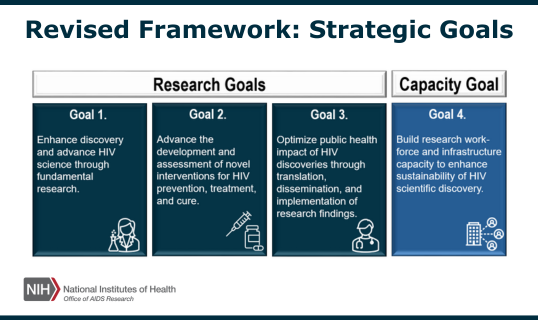Highlights: February 2024 NIH Office of AIDS Research Advisory Council Meeting
The 65th meeting of the National Institutes of Health (NIH) Office of AIDS Research Advisory Council (OARAC), broadcast via NIH VideoCast, featured updates on the development of the next NIH Strategic Plan for HIV and HIV-Related Research and a request for interested parties to provide input on HIV research priorities.
OARAC provides advice to OAR on the planning, coordination, and evaluation of research and other HIV/AIDS activities conducted or supported by NIH.
Report from the Acting Director of OAR
This meeting was the first for Diana Finzi, Ph.D., in her capacity as Acting Associate Director for AIDS Research at NIH and Acting Director of OAR. Dr. Finzi provided updates on several new NIH leadership changes relevant to the HIV research program: Monica Bertagnolli, M.D., as Director of NIH; W. Kimryn Rathmell, M.D., Ph.D., as Director of the National Cancer Institute; and Tara A. Schwetz, Ph.D., as Deputy Director for Program Coordination, Planning, and Strategic Initiatives. Dr. Schwetz provided opening remarks at the meeting.
Dr. Finzi also welcomed several incoming OARAC members and Ivy Turnbull, D.L.P., Ed.M., M.A., in her first official meeting as OARAC Chairperson. Dr. Turnbull is the Deputy Executive Director at the AIDS Alliance for Women, Infants, Children, Youth, and Families.
Dr. Finzi highlighted several OAR events:
- Upcoming:
- March 21-22, 2024 NIH HIV and Women Scientific Workshop
- April 24, 2024 NIH Workshop for Early Career Investigators in HIV.
- Recent:
- December 1, 2023 NIH World AIDS Day observance
- November 1-2, 2023 Community Voices: Forging the Path Forward for HIV Self-testing and Personalized Viral Load Monitoring.
Dr. Finzi concluded her remarks with discussion of OAR’s current efforts to develop the next NIH Strategic Plan for HIV and HIV-Related Research. This plan guides the largest public investment in HIV research, and OARAC members play a key role in its development.
2026-2030: NIH Strategic Plan for HIV and HIV-Related Research
OAR has initiated efforts across NIH Institutes, Centers, and Offices to establish HIV research priorities and develop the FY 2026-2030 NIH Strategic Plan for HIV and HIV-Related Research. The office aims to launch the new plan in the summer of 2025. OAR Senior Policy Advisor Rachel Anderson, Ph.D.; and OAR Senior Science Advisor CAPT Mary Glenshaw, Ph.D., M.P.H. described the current activities and outlined next steps toward developing the five-year plan. They requested input from OARAC and all interested parties via a Request for Information that is open until March 28, 2024.
A New Framework
OAR has proposed a new framework for the next five-year strategic plan. The new framework reflects the research continuum and is based on several foundational principles relevant throughout HIV research:
- Research to identify and address HIV-related health disparities is essential to ensure that the benefits of scientific advances reach all people and communities affected by HIV, including groups that have historically been underrepresented and underserved.
- Research must address the unique needs of people with HIV across the lifespan, particularly as people age with the virus, including those born with HIV.
- Engagement and partnership with communities affected by HIV are essential at every stage of research.
The proposed framework includes three broad research goals and one capacity-building goal that will be linked to corresponding objectives and topical priorities:

This updated framework allows for the increasing intersection of HIV prevention, treatment, comorbidities, and cure research across the continuum. Additional details are available via the OARAC meeting VideoCast.
Sources of Input and Timeline
Input from a broad range of sources is critical to establishing research priorities for the next strategic plan. OAR subject matter experts and the NIH HIV/AIDS Executive Committee provided input on the framework above and remain involved throughout the process. Researchers, practitioners, community advocates, federal partners, and the public provide input through various engagements, including a Request for Information, open until March 28, 2024.
OARAC, including leadership of NIH and the U.S. Department of Health and Human Services, plays a key role in the development of the plan. In addition to sharing direct input, OARAC members will be invited to participate in multi-sectoral task forces, convened by OAR and including experts from multiple sectors, to review and synthesize input and generate recommendations for research priorities.
Efforts to gather and synthesize input will continue through October 2024. OAR will then draft a plan and coordinate review with OARAC and across NIH, with the ultimate goal of launching the new plan in the summer of 2025. Stay tuned to the OAR website for continued updates.
Updates and Next Meeting
The meeting closed with updates from:
- NIH advisory bodies, including the National Advisory Allergy and Infectious Diseases Council, National Advisory Mental Health Council, National Advisory Council on Drug Abuse, and NIH HIV/AIDS Executive Committee.
- HIV Clinical Guidelines Working Groups of OARAC, which develop the HIV clinical practice guidelines that inform clinical practice in the U.S. and around the world.
Full details are available through the NIH VideoCast and meeting minutes on the OAR website.
The next OARAC meeting will take place on June 20, 2024. An agenda and additional details will be available on the OAR website. OARAC welcomes the submission of public comments via email to [email protected].
This page last reviewed on November 19, 2025

